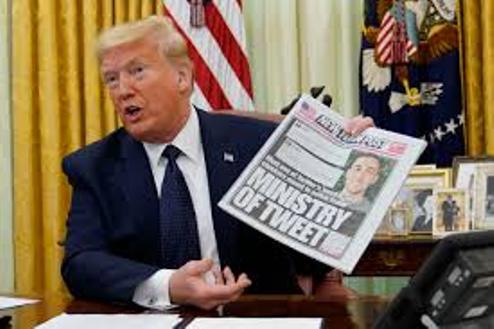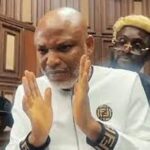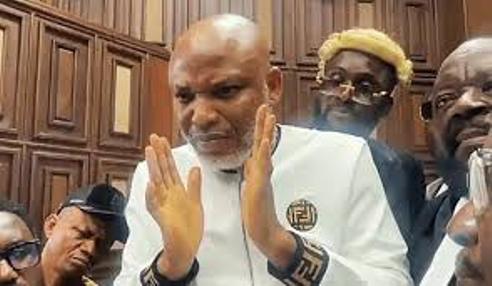
LAGOS MAY 29TH (NEWSRANGERS)-President Trump on Thursday ramped up his war with social media companies by signing an executive order that aims to curtail their legal liability protections – two days after Twitter slapped fact check labels to a pair of his tweets about fraud in mail-in voting for the first time.
“We’re here today to defend free speech from one of the greatest dangers it has faced in American history,” Trump said before signing the executive order in the Oval Office where Attorney General Bill Barr was present.
“A small handful of powerful social media monopolies,” Trump said, “had unchecked power to censure, restrict, edit, shape, hide, alter virtually any form of communication between private citizens or large public audiences.”
Trump declared, “We can’t let this continue to happen, it’s very, very unfair.”
The president added, “This censorship and bias is a threat to freedom itself. Imagine if your phone company silenced or edited your conversation. Social media companies have vastly more power in the United States than newspapers, they’re by far more rich than any other traditional forms of communication.”
Social media companies “that engage in censoring or any political conduct will not be able to keep their liability shield,” Trump vowed, adding that companies “like Twitter enjoy an unprecedented liability shield based on the theory that they are a neutral platform — which they are not.”
“My executive order further instructed the Federal Trade Commission to prohibit social media companies from engaging in any deceptive acts or practices,” said the commander in chief who at one point held up a copy of Thursday’s NY Post featuring a lead member of Twitter’s policing team who once called the president a “racist tangerine.”
Trump’s order directs federal agencies to look at whether they can place new regulations on the tech giants like Twitter, Facebook and Google, which owns YouTube.
“There’s no precedent in American history for so small a number of corporations to control so large a sphere of human interaction,” said Trump who claimed that Twitter is making “editorial decisions.”
“As president, I’m not allowing the American people to be bullied by these giant corporations. Many people have wanted this to be done by presidents for a long time,” he said, adding, “I’ve been called by Democrats that want to do this and so I think you could possibly have a bipartisan situation.”
The order calls for new regulations under Section 230 of the Communications Decency Act, a 1996 landmark federal law that largely exempts online platforms from legal liability for material posted by their users, allowing them to be treated more like publishers.
Rolling back those regulations would expose the tech companies to more civil liability thjrough lawsuits.
“Free speech is the bedrock of American democracy. Our Founding Fathers protected this sacred right with the First Amendment to the Constitution. The freedom to express and debate ideas is the foundation for all of our rights as a free people,” the order opens.
“In a country that has long cherished the freedom of expression, we cannot allow a limited number of online platforms to hand pick the speech that Americans may access and convey on the internet. This practice is fundamentally un-American and anti-democratic. When large, powerful social media companies censor opinions with which they disagree, they exercise a dangerous power. They cease functioning as passive bulletin boards, and ought to be viewed and treated as content creators.”
It goes on to note, “Today, many Americans follow the news, stay in touch with friends and family, and share their views on current events through social media and other online platforms. As a result, these platforms function in many ways as a 21st century equivalent of the public square. Twitter, Facebook, Instagram, and YouTube wield immense, if not unprecedented, power to shape the interpretation of public events; to censor, delete, or disappear information; and to control what people see or do not see.”
In a clear reference to Twitter’s fact check on Trump’s mail-in ballot tweets and Yoel Roth, the social media company’s executive who helped introduce the fact-check system earlier this month, the order says, “Twitter now selectively decides to place a warning label on certain tweets in a manner that clearly reflects political bias. As has been reported, Twitter seems never to have placed such a label on another politician’s tweet. As recently as last week, Representative Adam Schiff was continuing to mislead his followers by peddling the long-disproved Russian Collusion Hoax, and Twitter did not flag those tweets. Unsurprisingly, its officer in charge of so-called ‘Site Integrity’ has flaunted his political bias in his own tweets.
Barr said the order “sets up a rulemaking procedure that will eventually be under the FCC [Federal Communications Commission] to try to get back to the original interpretation and understanding of Section 230.”
“It also empowers the Attorney General to work with state attorneys general to come up with model legislation that addresses this mistake,” Barr said. “And we’re preparing federal legislation, which we’ll be sending over shortly, for the consideration of the Office of Management budget.”
Barr noted that the order does not “repeal” Section 230.
“I’m not against Section 230 if it was properly applied, but it’s been stretched and I don’t know anyone on Capitol Hill who doesn’t agree that it’s been stretched beyond its original intention,” he said.
The attorney general said the law has been “completely stretched to allow it to become really behemoths who control a lot of the flow of information in our society to engage in censorship of that information and to act as editors and publishers of the material.”
Barr compared the censorship to that of “foreign governments like Communist China.”
The order also calls for a review of “unfair or deceptive acts or practices” by the social media companies and for the FCC to determine whether actions like the editing of content by the tech companies should lead to the firms forfeiting the protections under Section 230.
Trump’s executive order calls on the government to reassess whether federal online advertising dollars should be held back from the social media giants if they “restrict free speech.”
Legal experts argue that any effort to modify Section 230 would be hit with a court challenge and is likely unconstitutional.
And Trump said he predicts “they’ll be doing a lawsuit,” but did not specify further.
When asked by a reporter during the signing of the executive order whether Trump — a prolific tweeter with more than 80 million followers — will delete his account, the president said, “If you weren’t fake. I would do it in a heartbeat. If we had a fair press in this country, I would do that in a heartbeat. There’s nothing I’d rather do than get rid of my own Twitter account.”
Earlier in the day, ahead of the signing, Trump tweeted, “This will be a Big Day for Social Media and FAIRNESS!”
On Tuesday, Twitter attached warning links to two of Trump’s tweets in which the president claimed that allowing large scale mail-in voting would result in a “rigged election.”
“Get the facts about mail-in ballots,” the label on the tweets state, and redirects users to news articles and disputing that voting-by-mail would allow for rampant fraud.
New York Post










